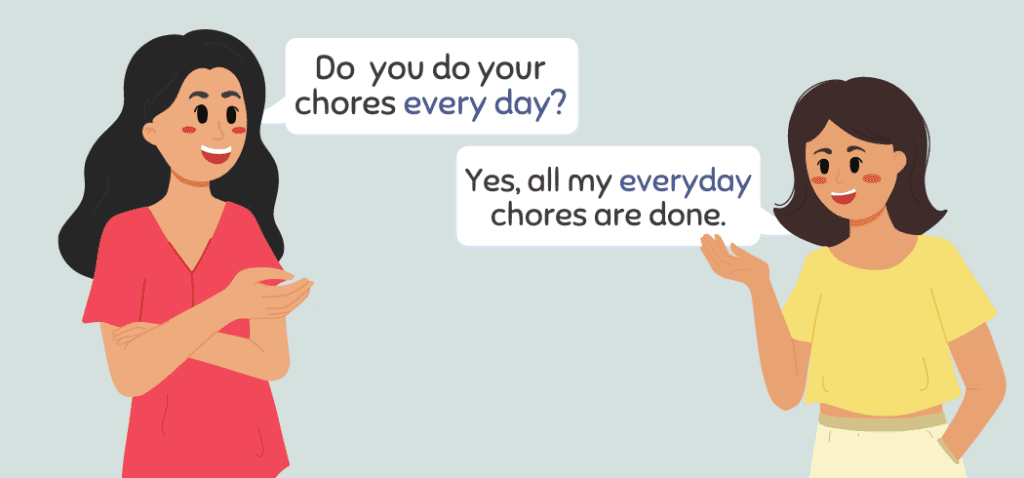The spelling of compound words can be confusing. There are hyphenated compound words. Some are joined as one word, while others are separated into two, like the confusion between everyday and every day.
Is every day one word or two? Is it everyday or every day? My guide will show you the difference between everyday and every day and answer your common questions. You’ll learn that both are the correct choice but have different meanings.
Everyday vs. Every Day–What’s the Difference?

Many people need clarification between the adjective everyday and the two-word phrase every day. They sound the same, but there’s a subtle difference in how they’re used. Everyday without space is an adjective. Meanwhile, every day with space is a phrase that means each day.
When to Use Everyday
Everyday as one word is an adjective that means of or relating to every day, of or ordinary days, or such as is met. We can describe an event as everyday when it’s not a holiday, special occasion, or Sunday.
Some synonyms for the one-word compound word include ordinary, mundane, commonplace, frequent, normal, prosaic, and usual.
One way to remember how to use everyday is to use it before a noun. We can use it in phrases like everyday clothing. This phrase is the opposite of fancy clothing unless fancy clothing is part of your everyday routine.
You can also say everyday dinner, which means your typical dinner. Think of what you usually have for supper. Is it mac and cheese, pizza, or a sandwich?
Other phrases include everyday situations, everyday tasks, and everyday signs. These phrases are the same as ordinary clothing, usual situations, mundane tasks, and frequent signs.
One exception is if the noun has other adjectives before it. One example is everyday blue jeans. Both everyday and blue are adjectives that describe the noun jeans.
When to Use Every Day
Use every day as a separate compound word that means each day. The best way to recall its meaning is to look at the space. Remember that the word every is a synonym for each. Therefore, every is an adjective that modifies the noun day.
Every day is an adverbial phrase because it usually describes verbs. In the sentence “We study every day,” every day is an adverbial phrase that describes the verb study.
How to Remember the DifferenceBetween Everyday and Every Day
The difference is that the former is actually an adjective, while every day is an adverbial phrase.
Everyday modifies nouns and pronouns. We find this word before nouns in sentences.
Every day does not modify nouns. Instead, it only describes verbs and adjectives. We find this word after verbs.
Everyday and Every Day in Sentences
Here are some examples of everyday in sentences.
- Riding the bus to school and taking tests are everyday occurrences for me.
- We use plastic plates for everyday meals and ceramic ones for special occasions.
- Don’t wear everyday clothes on your birthday.
- I will come to the party once I’ve finished my everyday chores at home.
- The crumbling of the FTX crypto empire may have damaged Brazilian retail and institutional sentiment toward crypto. However, its impact won’t affect everyday citizens—who will still use crypto for cross-border transactions. [CoinTelegraph]
- The Everyday Briefcase is no exception to the company’s quality, but it does need to be chosen carefully because it’s aimed at a fairly narrow audience. [Apple Insider]
Here are some examples of every day in sentences.
- We go to my sister’s house almost every day.
- Every day I wait for a letter to come.
- Do you go to work every day?
- People all over the world do this every day.
- However, having lower sodium content doesn’t mean you should be loading your meals and snacks with cheese without considering how much sodium you eat every day. [Eating well]
- That may still pale in comparison to those that, say, watch TV or listen to music every day—but it’s a lot more than it used to be. [The Verge]
So, Is It Everyday or Every Day?
This guide has taught you when to use everyday and every day. Everyday and every day are both right but have different meanings. This pair of words is a clear example of separated and open compound words. Remember:
- Every day with a space is an adverbial phrase that means each day.
- Everyday is an adjective that means usual, typical, and ordinary.

Comments are closed.